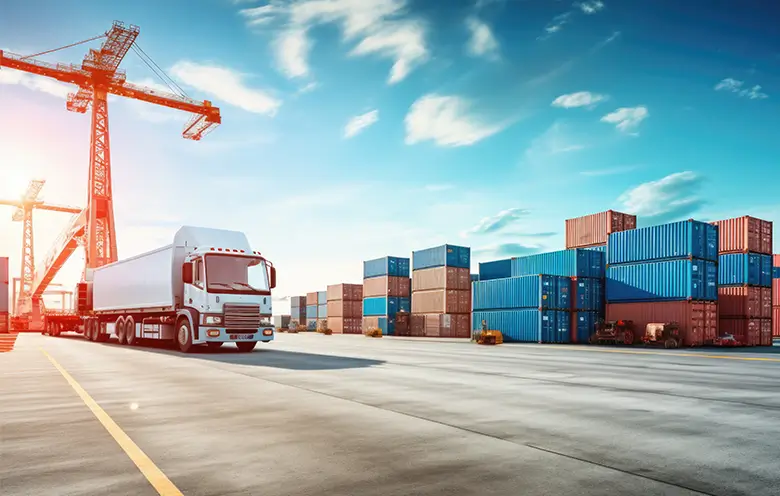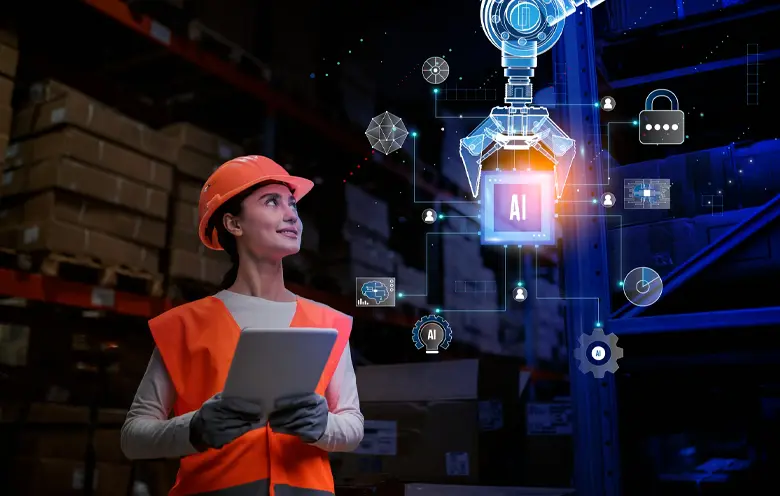Efficient order fulfillment and overall business success rely heavily on robust logistics and supply chain management in today’s fast-paced global economy. These functions are essential for every product-based industry, including retail, manufacturing, food, construction, and more.
However, these complex systems involve the coordination of resources, information, and transportation to ensure that goods move flawlessly from manufacturers to consumers. Although the difficulties in logistics processes like inventory management, demand forecasting, routes optimizing, and timely deliveries exhibit significant challenges.
To handle these issues efficiently, it is imperative for businesses to incorporate innovative solutions and streamline their processes to a point where even the possibility of occurrence of such challenges becomes rare.
Did you know:
- Artificial intelligence (AI) can reduce lost sales by 65% with better product availability.
- Over 80% of logistics companies are expected to use AI and machine learning by 2030.
- Companies using AI in supply chain management report a reduction in logistics costs by 15%.
- AI-enabled supply chains could help reduce forecasting errors by 20-50%.
- AI applications in supply chain could contribute up to $1.3 trillion annually to the global economy by 2026.
- AI in supply chain management is projected to save companies up to $41 billion annually by 2030.
This is where AI comes into play. By leveraging advanced algorithms, machine learning, and data analytics, AI can revolutionize logistics and supply chain management, offering unprecedented levels of efficiency, accuracy, and cost-effectiveness. In this blog, we will explore the transformative impact of AI on logistics, highlighting how it addresses key pain points and unlocks new opportunities for businesses striving for excellence in supply chain operations.
Let us start with the role of AI in logistics and supply chain
AI-driven solutions help businesses modify their inventory management, logistics, and demand forecasting methods. This makes their operations more flexible and effective, helping them thrive in the extremely competitive global market. Businesses can use artificial intelligence to optimize a wide range of processes, including material procurement decisions, inventory storage capabilities, and production schedules.
AI enables informed decision-making, resulting in optimal resource use and cost savings. By tracking and evaluating transportation data in real time, AI reduces fuel usage, anticipates maintenance needs, and enhances delivery routes. AI-powered predictive analytics also improves supply chain management by optimizing inventories, predicting demand, and boosting operational effectiveness. The continued development and integration of AI technology could lead to considerable growth and innovation in the supply chain and logistics industries in the future.
The application of AI in the logistics sector
Robotics and automation in storage
Warehouse operations are being completely transformed by AI-powered automation and robotics, such as autonomous mobile robots (AMRs) and robotic pickers. These “smart” systems are capable of a wide range of activities, including easy aisle navigation in AI warehouse automation.
Asset tracking in real time and warehouse visibility
Real-time visibility into your warehouse’s activities can be achieved with the deployment of AI-based sensor technologies and tracking. Businesses can maintain inventory, keep an eye on precious assets, and gather useful information about bottlenecks by utilizing RFID tags and IoT devices.
Improved order processing and transportation
Streamline your operations with order fulfillment systems with AI capabilities. Select the most efficient routes and frequency for order picking. This increases accuracy while lowering labor expenses for warehouses.
Predictive analytics for maintenance and layouts
AI can perform warehouse analysis and provide you with the best possible layouts and order fulfillment procedures. Additionally, it can keep an eye on your machinery and processes to forecast potential problems like equipment breakdowns, etc. This helps avoid downtime and take preventative measures.
Logistics company dramatically improved freight management and cut booking time by 50% using AI.
Some challenges of AI in logistics and supply chain management
The potential of AI in supply chain and logistics is undeniable. However, the path to AI dominance is not easy. Hence, it is critical to be aware of potential roadblocks to developing functional supply networks driven by AI.
System complexities: Cloud-hosted AI systems typically require large amounts of bandwidth. Operators may occasionally require specialized equipment to access these AI capabilities. For many supply chain partners, the cost of this hardware can constitute a sizable upfront investment.
Scalability: For optimum impact and efficacy, more initial start-up users or systems may be required, as most AI and cloud-based technologies are quite scalable. Supply chain partners and their AI development service providers will need to have a detailed conversation about this because every AI system is distinct and diverse.
Training expenses: Adoption of AI and its efficient use necessitate employee training, just like any other new technological solution. This will entail a long time and financial investment. The supply chain partners, and AI providers will have to collaborate closely to develop an impactful and reasonably priced training solution for the integration stage.
Costs of operations: An AI-operated gadget has an incredible network of individual processors, and every component in this network needs to be periodically maintained and repaired. There may be a significant operational investment considering the potential costs and energy required.
However, you can partner with an efficient AI services provider like Softweb Solutions to overcome these challenges. We deploy cloud-based AI solutions to minimize the need for specialized equipment, tailor scalable technologies to your needs, and offer robust maintenance services to manage operational expenses effectively.
How AI is revolutionizing the supply chain and logistics sector
1. Analysis of predictive data
Using historical data for demand forecasting can revolutionize logistics by managing stocks and optimizing workflows. AI analyzes data at various intervals, ensuring less than 1% error and better utilization of human labor. AI and analytics in supply chain optimization lower risks, increase profitability, and strategically schedule shipments using the best routes to expedite the process.
2. Management of workers
AI in logistics requires less administrative support if it is handled properly. AI also affects labor management in other ways. AI ensures optimal role assignment by training new personnel, tracking their performance, and identifying their strengths and limitations.
3. Warehouse and inventory control
With efficient inventory management, businesses can focus on selling rather than storage. AI predicts demand and confirms supply, analyzing data to forecast product popularity. This allows businesses to plan stock in advance, rather than reacting to demand as it arises.
Applying AI-driven forecasting to supply chain management can reduce errors by 20%-50%. -McKinsey
4. Enhanced security and performance
It is impossible to establish reliable connections between large, filtered data sets and to consistently analyze them manually while taking daily trends and constantly shifting external conditions into account.
Applications driven by artificial intelligence help analyze vast volumes of data, compare it to the external conditions of the same period, and use its intelligence to recommend specific courses of action. AI warehouse management can enhance inventory control by influencing workplace safety data and warning stakeholders of any risks.
5. Quick delivery
Artificial intelligence has an impact on the condition of the goods, the speed of delivery, and the customer’s desire to make additional purchases. AI systems can improve process speed, safety, and rationality in business by replacing manual controls and human elements.
Delivery automation has made it much easier to forecast when the goods will reach their delivery locations. The search for the fastest route, the simplicity of tracking a shipment, and the speed at which many locations may be reached by air travel improve the delivery process.
6. Optimization of routes
Route optimization is an essential part of logistics because it determines the most efficient way for goods to move from one location to another. This is achieved by examining several factors, such as delivery schedules, traffic, and distance. Logistics companies can use AI to analyze massive amounts of data to optimize their delivery routes to save fuel costs, enhance delivery times, and promote driver safety. AI algorithms can interpret data from multiple sources, such as weather forecasts, GPS monitoring, and traffic sensors, to choose the best route.

The advantages of agile cloud-based AI techniques
1. Optimized information
Legacy systems are not prepared to handle the current business requirements because they were developed before artificial intelligence and machine learning. To facilitate rapid integration, newer platforms are constructed with technological stacks that can manage data capture, storage, processing, analysis, and visualization. Supply chain firms can immediately benefit from these new capabilities without waiting for legacy vendors to incorporate machine learning algorithms into their platforms.
2. Computerized critical evaluations
Even with the use of conventional business intelligence tools, it can be challenging for a human to identify patterns in inefficiencies in supply chain activities due to their complexity. By using AI tools, operations teams may shorten the time it takes to examine data. Analysts can use this information to pinpoint improvement areas, project demand and inventory levels, plan maintenance and downtime operations, and anticipate equipment failures.
3. Enhanced ability to compete
Artificial intelligence is essential to maintaining competitiveness; it speeds up and improves the efficiency of decision-making by reducing processing times. AI offers insights into weather patterns and market trends that could affect operations. This data is crucial for upholding industry reputation and solid customer connections.
Leverage the potential of artificial intelligence for logistics!
In the logistics sector, artificial intelligence is a real force to be reckoned with. It offers amazing chances to automate repetitive activities, boost productivity, and cut expenses. Businesses can benefit from the applications of AI in logistics and maintain an advantage over competitors. All organizations can benefit from AI, whether they are involved in more traditional logistics or e-commerce logistics.
The logistics sector has countless opportunities as AI technology develops further: data integration and compatibility, scalability, precise forecasting, skill gaps, increasing efficiency, and more! To know more about how AI can help you grow your logistics and supply chain, talk to our experts!


